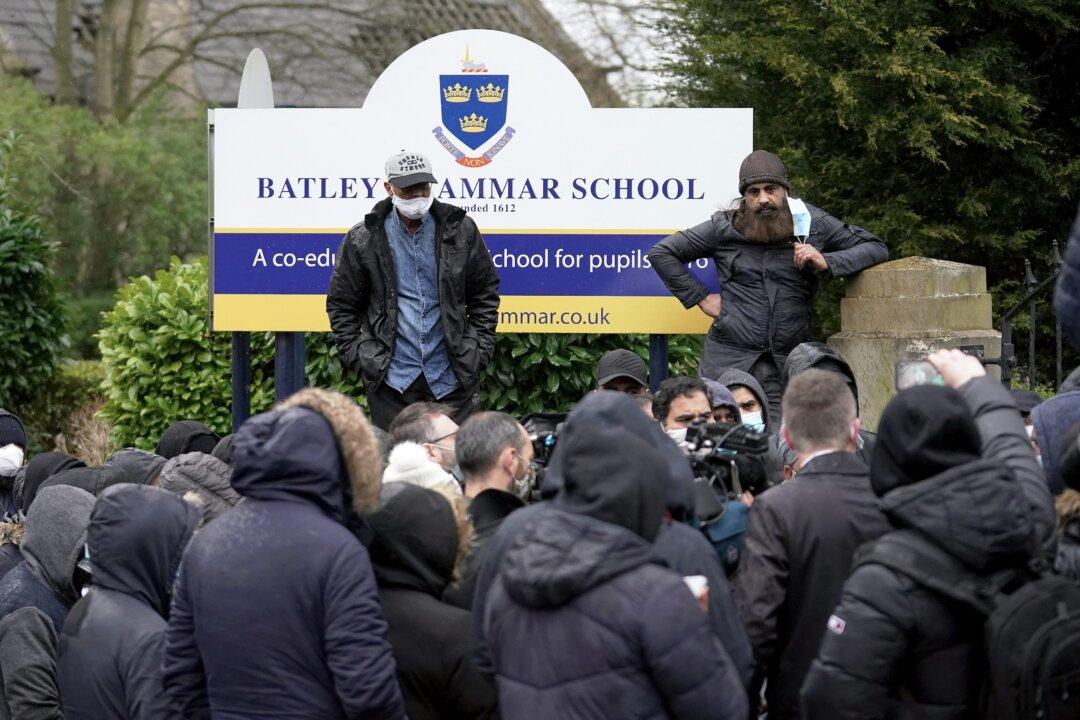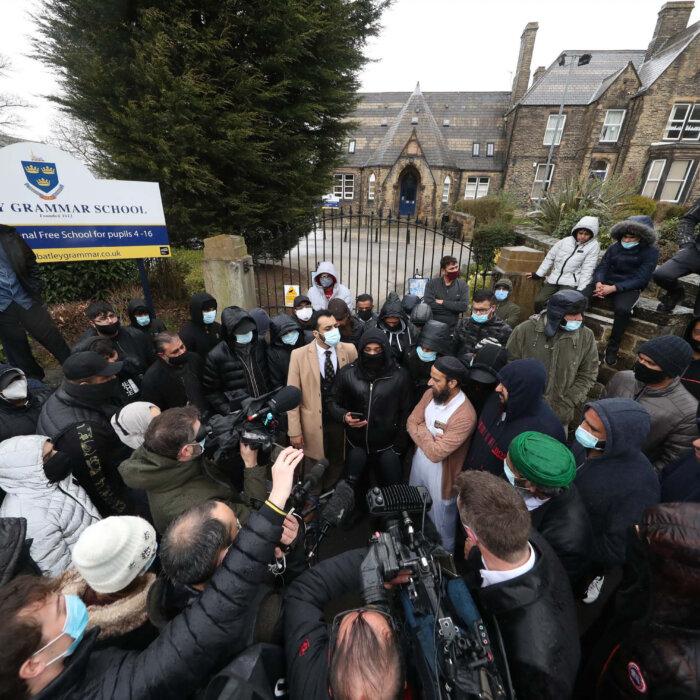Local agencies including the police and Batley Multi Academy Trust have “let down” the religious studies (RS) teacher forced into hiding following accusations of blasphemy, a report has found.
The RS teacher went into hiding in March 2021 after he showed his class a caricature of the Islamic Prophet Muhammad during a lesson on British values, prompting protests outside Batley Grammar School in West Yorkshire.
Not Treated as a Victim of Crime
Suffering from post-traumatic stress disorder and at times feeling “incredibly distressed and suicidal,” the report said the teacher’s trauma had been “compounded by the lack of support and care by local agencies.”“Despite being cleared of any malicious intent by an independent investigation two months later, our review of his case demonstrates that he was not considered a victim of crime, he was not entitled to, nor did he receive any of the provisions set out in the Victims Code,” the report said.
“In failing to understand the seriousness of the incident, he was let down by all the agencies involved, most notably Kirklees Council, West Yorkshire Police and the Batley Multi Academy Trust.”
Dame Sara, the government’s independent adviser for social cohesion and resilience, said in her review that the agencies “should have issued clear messages that threats, harassment and abuse would not be tolerated under any circumstances.
‘Disproportionate Concern’ Given to Not Causing Offence
The report also observed the “disproportionate concern” given to not causing offence to “the religious sensibilities” of those who engaged in intimidation and harassment, criticising agencies for “appeasing the protestors to secure the end of the protests – at the expense of the religious studies teacher” which “appeared to be the priority.”“Such an approach would arguably undermine cohesion in the long-term as it appears to appease and encourage those who create an intimidating environment to enforce their beliefs, irrespective of the rights of others,” the report said.
Further, the report noted it has heard of “more cases of self-appointed ‘community faith leaders’ aggressively interfering in everyday teaching at some schools in Batley,” which created a “climate of fear.”
The Khan Review suggested that this indicated there was a “wider cultural problem in the area that is not being adequately addressed.”
The review said it has also heard of “similar examples” across the country of teaching staff experiencing “freedom-restricting harassment.”

‘Threatening Behaviour Is Taken Seriously’
A spokesperson from Batley Grammar School said the school was “disappointed” by the report, stating: “We do not recognise much of what is in it, its description of the events, nor the characterisation of the school and community. We let the Government know ahead of publication that its draft contained a number of factual inaccuracies but note that these have not been corrected.“We are also surprised that the authors of a report on social cohesion decided that the right thing to do was name our school and identify some individuals. However, our school and community is in a very positive place and we know that this report will not upset that.”
West Yorkshire Police told The Epoch Times: “We are aware of the concerns in this report regarding our response to this incident and note the recommendations, which we will be reviewing with our partner agencies.
“Threatening behaviour is taken seriously and measures were put in place to manage this incident and the repercussions which resulted from it. This included the provision of a personal contact officer for the teacher and his family. A full investigation was also carried out into the offences reported.”
“West Yorkshire Police works hard to engage with all communities within its policing area, investing in Neighbourhood Policing Teams and specialist investigators to investigate offences and reduce tensions which may arise as swiftly as possible,” the spokesperson added.
Responding to the review’s findings, a Kirklees Council spokesperson told The Epoch Times: “The council has fully engaged with the review over the past two years and gave evidence to it. We will look carefully at the recommendations and any lessons to be learned by the government, councils, and partner organisations.
‘Freedom-Restricting Harassment’ Corroding Democratic Rights
The in-depth victim case study forms part of the independent report on social cohesion, with Dame Sara labelling the Batley teacher a victim of what she terms “freedom-restricting harassment”: when people experience intimidation, threats, or abuse intended to make institutions or individuals “censor or self-censor out of fear.”Freedom-restricting harassment “has become widespread and is corroding both social cohesion and our democratic rights and freedoms,” the review said, with the “wide-spread phenomenon of extreme forms of harassment leading individuals into silence, self-censoring, or abandoning their democratic rights.”
Freedom-restricting harassment involves doxxing, sending threats of violence, and inciting hatred or violence against individuals. While associated with high-profile individuals such as politicians, Dame Sara said her evidence indicates that victims come from a range of class, political, and cultural spectrums.
3 in 4 Have Self-Censored
The issue has also become a concern for ordinary citizens. The review commissioned an online poll of 1,279 people aged over 16, with a large majority (85 percent) of the public believing freedom-restricting harassment occurs in the UK. Some 60 percent think the problem is worse than five years ago.More than three in four (76 percent) said they have restricted expressing their personal opinions in public out of fear of harassment.
The report’s author, Damon L. Perry, said that “teachers must not feel the need to self-censor out of fear. Headteachers, who set school policy, should not be bullied by de facto blasphemy codes.”







